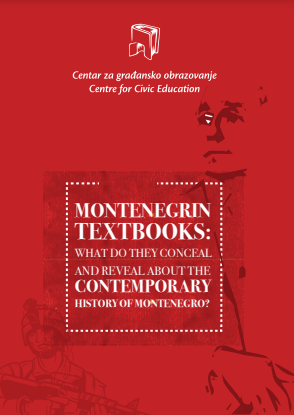Montenegrin textbooks: what do they conceal and reveal about the contemporary history of Montenegro?
Montenegrin textbooks: what do they conceal and reveal about the contemporary history of Montenegro?
Author(s): Isidora Radonjić, Tamara Milaš, Miloš Vukanović
Contributor(s): Daliborka Uljarević (Editor)
Subject(s): Education, Recent History (1900 till today), School education, Higher Education , State/Government and Education
Published by: Centar za građansko obrazovanje (CGO)
Keywords: Montenegro; education; textbooks; contemporary history; analysis;
Summary/Abstract: Centre for Civic Education (CCE), within its sub-programme Transitional justice, aims to contribute to the effective process of facing with the past through series of different, yet interconnected, activities. In this respect, the CCE team, within its study “Montenegrin textbooks: what do they conceal and reveal about the contemporary history of Montenegro?”, analysed the content of material which is nowadays available in formal education system, including primary, secondary and higher education level, whereby higher education was analysed through the sample of three faculty units of the University of Montenegro. Furthermore, a research was conducted with the objective to assess the impact of some of the effects of such education approach on the (lack of) knowledge of students. Finally, an assessment of the existing model of history teaching, with accompanying recommendations to modernise and harmonise it with the needs of a society, which tends to develop into a democratic, is also provided. Focus of this study, among other issues, was on the manner in which the causes, course and outcome of war events which marked the history of region, thereby of Montenegro as well, are presented in the Montenegrin education system. Unfortunately, Montenegrin textbooks are practically “cleansed” of all potentially “dangerous” content, which restricts the potential of society to comprehend and evaluate that period based on facts, which further encumbers the already arduous process of facing the past. History teaching should develop critical thought and spirit of tolerance, prevent or challenge the existing prejudice and promote openness towards diversity. However, judging by what Montenegrin students can learn through the formal education system, we are far from that. Namely, Montenegrin students cannot learn in schools either on the extent or the manner in which Montenegro participated in war events, nor which war crimes were perpetrated during the nineties in region and in Montenegro, nor how many victims were on the behalf of Montenegro, from Montenegro and in Montenegro. Montenegrin educational institutions still demonstrate insufficient will that is necessary to resist the politicisation of textbooks, either in what they conceal or reveal, which questions the educational role of history as a subject, at least when it comes to contemporary history of Montenegro. Moreover, it is concerning that this approach is present on every level of education – from primary to higher, which already yields the teaching staff which does not have this part of history in his/her memory, nor has had the chance to learn about it adequately, but already enters classroom to teach it. “Remembrance” occurs under the influence of many factors, out of which one of the most influential is the history teaching in schools, and especially history textbooks. They promote a certain value system, legitimise and determine political and social order. Therefore, it could be said that education obtained in schools is the result of complex relations of power and fight of groups determined by class, gender and religious belief. Precisely because of that, textbooks play a paramount role and serve as important levers of power in every part of the world.1 Hence, it is necessary to change the existing textbooks and update them, while persons in charge of this task should have the integrity to refuse making compromises with authorities on the manner in which Montenegrin contemporary history should be presented, history already marked by those who are still high on the political ladder of Montenegro.
Series: CGO - Ljuska prava
- Page Count: 29
- Publication Year: 2016
- Language: English
- Content File-PDF
- Introduction

